Related Research Articles

Louis Daniel Armstrong, nicknamed "Satchmo", "Satch", and "Pops", was an American trumpeter and vocalist. He was among the most influential figures in jazz. His career spanned five decades and several eras in the history of jazz. He received numerous accolades including the Grammy Award for Best Male Vocal Performance for Hello, Dolly! in 1965, as well as a posthumous win for the Grammy Lifetime Achievement Award in 1972, and induction into the National Rhythm & Blues Hall of Fame in 2017.
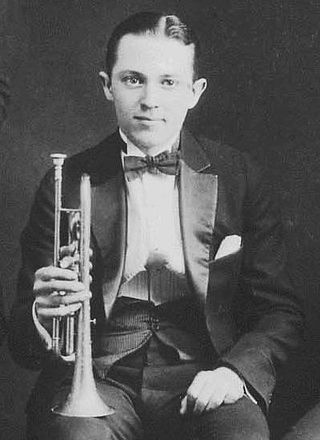
Leon Bismark "Bix" Beiderbecke was an American jazz cornetist, pianist and composer.

Joseph Nathan "King" Oliver was an American jazz cornet player and bandleader. He was particularly recognized for his playing style and his pioneering use of mutes in jazz. Also a notable composer, he wrote many tunes still played today, including "Dippermouth Blues", "Sweet Like This", "Canal Street Blues", and "Doctor Jazz". He was the mentor and teacher of Louis Armstrong. His influence was such that Armstrong claimed, "if it had not been for Joe Oliver, Jazz would not be what it is today."

The Original Dixieland Jass Band (ODJB) was a Dixieland jazz band that made the first jazz recordings in early 1917. Their "Livery Stable Blues" became the first jazz record ever issued. The group composed and recorded many jazz standards, the most famous being "Tiger Rag". In late 1917, the spelling of the band's name was changed to Original Dixieland Jazz Band.
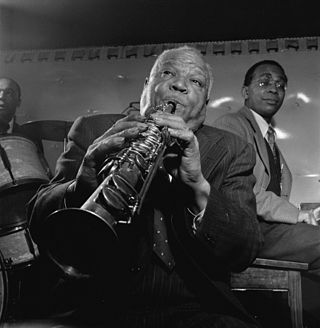
Sidney Joseph Bechet was an American jazz saxophonist, clarinetist, and composer. He was one of the first important soloists in jazz, and first recorded several months before trumpeter Louis Armstrong. His erratic temperament hampered his career, and not until the late 1940s did he earn wide acclaim. Bechet spent much of his later life in France.

Clarence Williams was an American jazz pianist, composer, promoter, vocalist, theatrical producer, and publisher.
Johnny Dodds was an American jazz clarinetist and alto saxophonist based in New Orleans, best known for his recordings under his own name and with bands such as those of Joe "King" Oliver, Jelly Roll Morton, Lovie Austin and Louis Armstrong. Dodds was the older brother of drummer Warren "Baby" Dodds, one of the first important jazz drummers. They worked together in the New Orleans Bootblacks in 1926. Dodds is an important figure in jazz history. He was the premier clarinetist of his era and, in recognition of his artistic contributions, he was posthumously inducted into the Jazz Hall of Fame. He has been described as "a prime architect in the creation of the Jazz Age."

Warren "Baby" Dodds was an American jazz drummer born in New Orleans, Louisiana. He is regarded as one of the best jazz drummers of the pre-big band era. He varied his drum patterns with accents and flourishes, and he generally kept the beat with the bass drum while playing buzz rolls on the snare. Early influences included Louis Cottrell, Sr., Dave Perkins, and Tubby Hall. Dodds was among the first drummers to be recorded improvising while performing.
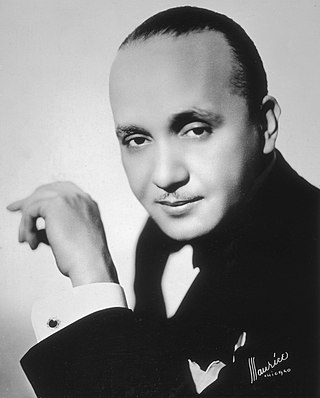
James Fletcher Hamilton Henderson was an American pianist, bandleader, arranger and composer, important in the development of big band jazz and swing music. He was one of the most prolific black musical arrangers and, along with Duke Ellington, is considered one of the most influential arrangers and bandleaders in jazz history. Henderson's influence was vast. He helped bridge the gap between the Dixieland and the swing eras. He was often known as "Smack" Henderson.
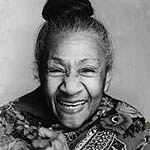
Alberta Hunter was an American jazz and blues singer and songwriter from the early 1920s to the late 1950s. After twenty years of working as a nurse, Hunter resumed her singing career in 1977.

William C. "Buster" Bailey was an American jazz clarinetist.

George Sylvester "Red" Callender was an American string bass and tuba player. He is perhaps best known as a jazz musician, but worked with an array of pop, rock and vocal acts as a member of The Wrecking Crew, a group of first-call session musicians in Los Angeles.
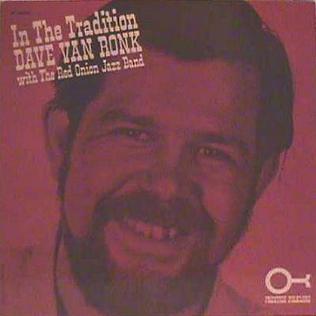
In the Tradition is a 1963 album by American folksinger Dave Van Ronk and The Red Onion Jazz Band. It is unusual in that the tracks are evenly split between Van Ronk and the Red Onions.
Dixieland jazz, also referred to as traditional jazz, hot jazz, or simply Dixieland, is a style of jazz based on the music that developed in New Orleans at the start of the 20th century. The 1917 recordings by the Original Dixieland Jass Band, fostered awareness of this new style of music.

The period from the end of the First World War until the start of the Depression in 1929 is known as the "Jazz Age". Jazz had become popular music in America, although older generations considered the music immoral and threatening to cultural values. Dances such as the Charleston and the Black Bottom were very popular during the period, and jazz bands typically consisted of seven to twelve musicians. Important orchestras in New York were led by Fletcher Henderson, Paul Whiteman and Duke Ellington. Many New Orleans jazzmen had moved to Chicago during the late 1910s in search of employment; among others, the New Orleans Rhythm Kings, King Oliver's Creole Jazz Band and Jelly Roll Morton recorded in the city. However, Chicago's importance as a center of jazz music started to diminish toward the end of the 1920s in favor of New York.

The Smithsonian Collection of Classic Jazz is a six-LP box set released in 1973 by the Smithsonian Institution. Compiled by jazz critic, scholar, and historian Martin Williams, the album included tracks from over a dozen record labels spanning several decades and genres of American jazz, from ragtime and big band to post-bop and free jazz.
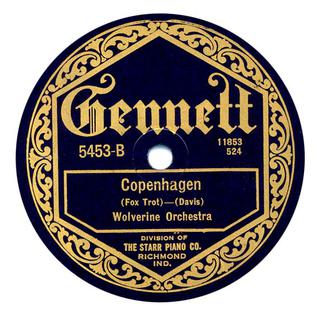
Copenhagen is a jazz standard composed in 1924 by bandleader Charlie Davis and first recorded in that year by the Wolverine Orchestra featuring Bix Beiderbecke in a foxtrot tempo. The title refers to Copenhagen tobacco, favored by Davis's bass player. Lyrics were added by Walter Melrose to the tune, which is a blues in B-flat.

The Red Onion Jazz Band was a trad jazz band formed in Melbourne (Australia) in the early 1960s and was also known as "The Red Onions" and "The Onions".
Narcisse J. "Buddy" Christian was an American jazz banjoist, guitarist, and pianist.
References
- ↑ "Red Onion Jazz Babies". Red Hot Jazz Archive. Retrieved 2021-01-08.
- ↑ "Red Onion Jazz Babies - Terrible Blues (1924)". YouTube. Archived from the original on 2016-04-18. Retrieved 2010-06-13.